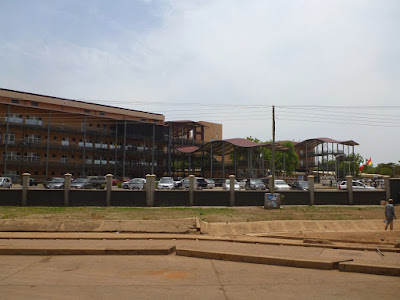 |
| Sign in the OPD Department |
This week we had the incredible opportunity to work at the Shekhina Clinic in Tamale. The clinic is run by Dr. Abdulai, who unfortunately we did not get to meet as he was away this week. However, we were greeted by amazing, volunteer staff who truly seem to love their work. A nurse named Charity showed us around and I have to say this is one of the most beautiful placements we could imagine. Amidst the huge mango trees we found an out patient department, medication dispensary, operating room, and homes for patients to stay in. While we were there the clinic had 25 people living in their facilities. The clinic services people who suffer from various medical conditions and mental illnesses. Not only that, but it serves as a safe haven for people who have had surgery, are unable to care for themselves, or have been rejected by their communities.
 |
| Patients waiting for the gates to open |
In April Dr. Abdulai's clinic will be celebrating its 25th anniversary. Shekhina provides all of its services for free and is only able to run based on generous donations of organizations and individuals. Because of this, some staff told us, the clinic is not always able to operate. Some unique strategies have been used to adjust to resource availability. When it comes to housing Dr. Abdulai partners with chiefs around Ghana. Each chief is asked to build a home at the Shekhina clinic. If for any reason a person from that village then needs medical services, they have a designated hut to stay in at the clinic.
People from all around Tamale line up outside the clinic every morning. On average the clinic accepts 30 patients a day, plus review cases and emergencies. Since all services are provided at no cost the patients and residents assist in cleaning the clinic and maintaining the grounds. They then return the next day to be seen at the OPD.
 |
| Out Delivering Hot Lunches |
 |
| Hot Lunch Program |
The more we learned about the clinic, the more we fell in love. We were able to participate in health screening, pharmacy, patient teaching, and much more. The staff shared a beautiful spread of oranges, bananas, ground nuts, and Lipton yellow label tea with us. We were readily embraced with a perfect experience of everything that nursing and health care stand for: humility, compassion, caring, and love. After sharing our morning tea with the clinic's staff we each had an afternoon participating in the food program. Sitting on the back of an open truck bed we drove around Tamale delivering hot lunches to "poor, desolate and mentally challenged" people in the community. Lunches of jollof rice, fruit, and vegetables, from the clinic's garden are taken to approximately 70 individuals daily.
The generosity and hospitality of the Ghanaian people continue to amaze and inspire us. We are grateful for the opportunity to apply our clinical knowledge, but we are equally (if not more) grateful for everything we are learning while being here. Everyday we meet people from vulnerable populations who continue to find joy, faith, and gratitude wherever they can.
 |
| The Beautiful Staff |
~ By Victoria Cluett




















